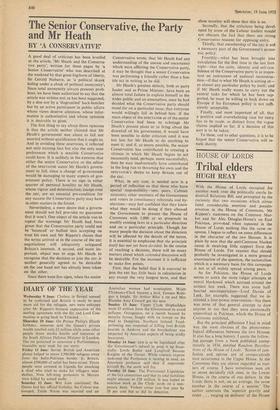The Senior Conservative, the Party and Mr Heath
BY 'A CONSERVATIVE'
A good deal of criticism has been levelled at the article, 'Mr Heath and the Conserva- tive party', written for these pages by 'a Senior Conservative' who was described at the weekend by that great fog-horn of liberty, Sir Gerald Nabarro, as 'a political skunk hiding under a cloak of political anonymity', Since total anonymity always presents prob- lems, we have been authorised to say that the article was written not, as has been suggested, by a don nor by a 'disgruntled' back-bencher but by an active participant in public affairs whose views deserve attention, whose infor- mation is authoritative and whose opinions it is desirable to gloss.
The first thing to say about those opinions is that the article neither claimed that Mr Heath's government was about to fall nor asserted without qualification that it ought to. And in avoiding these assertions, it reflected not only existing fact but also the only sane preferences which a sensible Conservative could have. It is unlikely in the extreme that either the senior Conservative or the editor of the SPECTATOR wants Mr Heath's govern- ment to fall, since a change of government would be damaging to many aspects of gov- ernment policy. There is no sign in either quarter of personal hostility to Mr Heath, whose vigour and determination, except over the EEC, are an essential pre-condition for any success the Conservative party may have in other matters in the future.
Nevertheless, a mere desire that a govern- ment should not fall provides no guarantee that it won't. One object of the article Nvas to repeat the warnings Mr Heath had been given that the Conservative party could not be 'bounced' or bullied into accepting on trust his own and Mr Rippon's claims that the terms arrived at in the course of the EEC negotiations will adequately safeguard Britain's interests. A second, and more im- portant, object was to urge Mr Heath to recognise that the decision to join the EEC is neither generally agreed to be desirable on the one hand nor has already been taken on the other.
Since there were few signs, when the senior Conservative wrote, that Mr Heath had any understanding of the unease and uncertainty which were afflicting the Conservative party, it may be thought that a senior Conservative was performing a friendly rather than a hos- tile act in writing as he did.
Mr Heath's greatest defects, both as party leader and as Prime Minister, have been an almost total failure to explain himself to the wider public and an assumption, once he had decided what the Conservative party should stand for on a particular issue, that everyone
would willingly fall in behind him. If the main object of the SPECTATOR or of the senior Conservative had been to sabotage Mr Heath's present plans or to bring about the downfall of his government, it would have been sensible to defer criticism until it was too late for Mr Heath to do anything to meet it; and if, as seems possible, the senior Conservative has contributed to creating a climate in which Mr Heath begins to act reasonably (and, perhaps, more successfully), then he may inadvertently have contributed in the long run to thwarting his own, and the SPECTATOR'S desire to keep Britain out of the EEC.
What, in any case, is needed now is a period of reflection so that those who have special responsibility—MPs, peers, Cabinet ministers, other members of the Government and voters in constituency referenda and by- elections—may feel confident that they know what they would be doing if they allowed the Government to present the House of Commons with 1,000 or so proposals to modify existing laws in a particular direction and on a particular principle. Though for many people the decision about the direction will be affected by the details of the terms, it is essential to emphasise that the principle itself has not yet been decided. In the course of reaching a decision, there will be many matters about which extended discussion will be desirable. For the moment it is sufficient to make five points.
First, that the belief that it is essential to join the EEC has little basis in calculation in any except the very longest term, and that
close scrutiny will show that this is so.
Secondly, that the criticisms being devel- oped by some of the Labour leaders should not obscure the fact that there are strong Conservative reasons for opposing entry.
Thirdly, that membership of the EEC is not a necessary part of the Government's econo- mic policy.
Fourthly—what has been brought into calculation for the first time in the last fort- night—that the unity, identity and self-con- fidence of the Conservative party is as impor- tant an instrument of national reconstruc- tion—if that is what Mr Heath is aiming at— as almost any particular policy by itself; and if Mr Heath really wants to carry out the central tasks for which he has been sup- ported, he must be willing to back down on Europe if his European policy is not suffi- ciently acceptable.
Finally, and most important of all, that a positive and overwhelming case for entry 'has to be made, as distinct from the vague claims implied so far, if a decision of this sort is to be taken.
To these, and to other questions, it is to be hoped that the senior Conservative will re- -turd shortly.


































 Previous page
Previous page